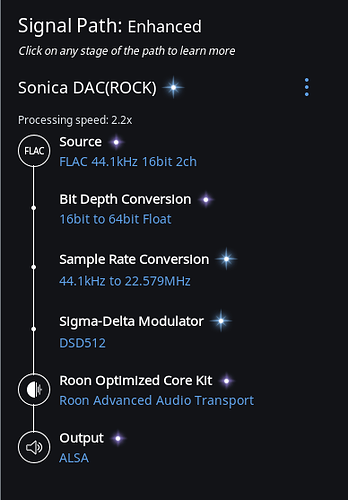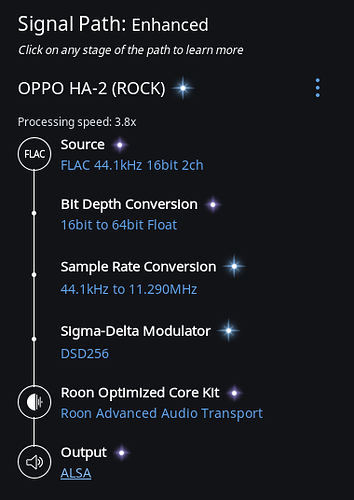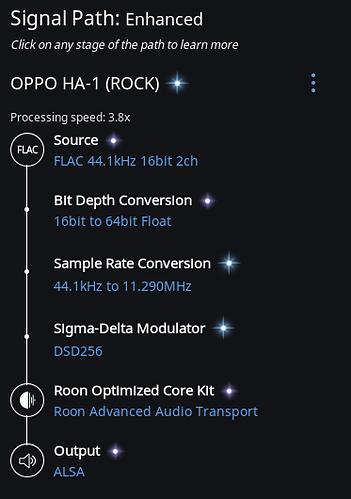I have decided to convert my NUC to ROCK. I bought a new M.2 SSD so that I could keep my Windows 10 setup on the existing M.2. My question is will ROCK recognize my Oppo HA-1? On Windows I have to install an OPPO driver but I don’t recall seeing a LINUX driver for it. Am I out of luck?
Harry,
As you stated ROCK is based on the LINUX kernel.
I pulled the following info from the Oppo website…
Software Driver for USB Audio DAC:
For Windows 7, 8 and 10: software driver download link (version 3.26, released on 5/3/2016). For Windows XP and Vista: software driver download link (version 2.24, released on 2/23/2015). Please unzip the downloaded package and double-click on the “setup.exe” file, then follow the on-screen instructions to finish this installation. Select the HA-1 as your sound output device by setting “Control Panel -> Hardware and Sound -> Sound -> Playback” to “OPPO HA-1 USB Audio 2.0 DAC”.
For Mac computers, no software driver is required. Please set “System Preferences -> Sound -> Output” to “OPPO HA-1 USB Audio 2.0 DAC”.
For recent Linux systems that support USB Audio Class 2.0, no software driver is required.
For Chrome OS, no software driver is required.
Hope this helps.
MD
Straight off the Oppo HA-1 web page:
For recent Linux systems that support USB Audio Class 2.0, no software driver is required.
The Kernel ROCK is built on is recent.
Thanks so much. That helps. Sure hope ROCK runs better than Roon on Win 10; have had stability problems.
Thanks, Henry. Sounds like ROCK setup will be easy.
I think like the MAC you will find that it only gets to DSD128 - to get to DSD256 you need windows’ ASIO driver
Same is true for the OPPO Sonica DAC, but in its case you get DSD256 and not the DSD512 that the Sonica is capable of with ASIO on Windows.
For this reason I use both my HA-1 and Sonica on a Windows 10 endpoint still, and let the NUC sit on its own with no DAC’s connected.
Too bad about limit to DSD128. Not sure my 68 year old ears could tell the difference but with the PM-1 'phones small differences are noticeable. The stability problem with Win 10 may be the files on my NAS. For some reason I have many blank folders and folders with both FLAC and AIFF versions of the same songs. I am cleaning the NAS up now but all that takes time. I refuse to let software do it because I have used Easy Duplicate Finder and think that it caused some of the problems. After I get the NAS cleaned up I may be able to go back to Windows 10. But now Roon crashes frequently on Win 10 to the point that it is not useable. Strange since before a couple of weeks ago everything ran perfectly. It also crashes on a Dell i7 desktop so the NUC itself is not the problem. Got something wrong somewhere…
Hope you don’t have some malware or virus in thee causing issues. My win10pro64bit is very stable but is not on a commercially setup hardware build. NUC rock is also very stable and so for that matter is core on my Mac. I’m using Synology NAS with 140,000+ tracks
Hmm. I am seeing DSD256 as available upsampling. Got everything running on ROCK last night. Very fast and stable so far. With Win 10 I had a dedicated monitor for selecting music so now it can be retired:slight_smile:
Yeah, mine was stable for a long time but has been bombing out lately. Got ROCK running and seems to be very stable so far.
In most case DoP support for Linux like ROCK is straight forward. So far the highest it can go is DSD256, with DoP. It uses 705.6kHz PCM transport stream. Anything higher like DSD512, it will probably need native DSD support. Support of native DSD requires patch up in Linux which is time consuming.
@Harry_Jones Some good news… not sure which OS update in ROCK changed this but I now have Oppo Sonica running DSD native in Audio settings and up sampling to DSD512 with the DAC displaying DSD @ 22.579MHz via USB so same as using ASIO on Windows. 
I just tried it with the HA-1 and HA-2 just to keep on topic…We can get it at Native 256 now for that too !!!
And the Same for at HA-1, HA-2 and Sonica on RPi with Ropieee at DSD256 but not on the Sonica at DSD512 unfortunately @spockfish - Seems the poor old RPi can’t keep up past DSD256 
The difference between the HA-2 with 3.5mm stereo (no TRRS) and the Balanced headphones out on the HA-1 to the PM-2 headphones is pretty big…in the HA-1’s favour. Even running it off a RPi with Ropieee I can get DSD256 via network connections. Very happy … not sure how wifi will keep up on RPi but it seems to be doing OK for now to a Sonica DAC @ DSD256
Update DSD512 works for the Sonica DAC only wired (LAN) not wifi.
Can you do something for me?
Login on the RoPieee, and run
lsusb -v
Thanks in advance!
Done in 10 chars
Thanks!
And… pretty please … one more?
cat /proc/asound/card*/stream*

Sorry I crashed…having a cold doesn’t help the situation either. Hope the info helps.
I might need to do the same for the Vinshine R2R with the Amanero Combo 384 too and see if thats playing nice at DSD256 now too
[root@LCDManCaveRack ~]# cat /proc/asound/card*/stream*
OPPO OPPO Sonica DAC USB AUDIO 2.0 D at usb-3f980000.usb-1.2, high speed : USB Audio
Playback:
Status: Stop
Interface 1
Altset 1
Format: S32_LE
Channels: 2
Endpoint: 1 OUT (ASYNC)
Rates: 44100, 48000, 88200, 96000, 176400, 192000, 352800, 384000, 705600, 768000
Data packet interval: 125 us
Interface 1
Altset 2
Format: SPECIAL DSD_U32_BE
Channels: 2
Endpoint: 1 OUT (ASYNC)
Rates: 44100, 48000, 88200, 96000, 176400, 192000, 352800, 384000, 705600, 768000
Data packet interval: 125 us
[root@LCDManCaveRack ~]#


